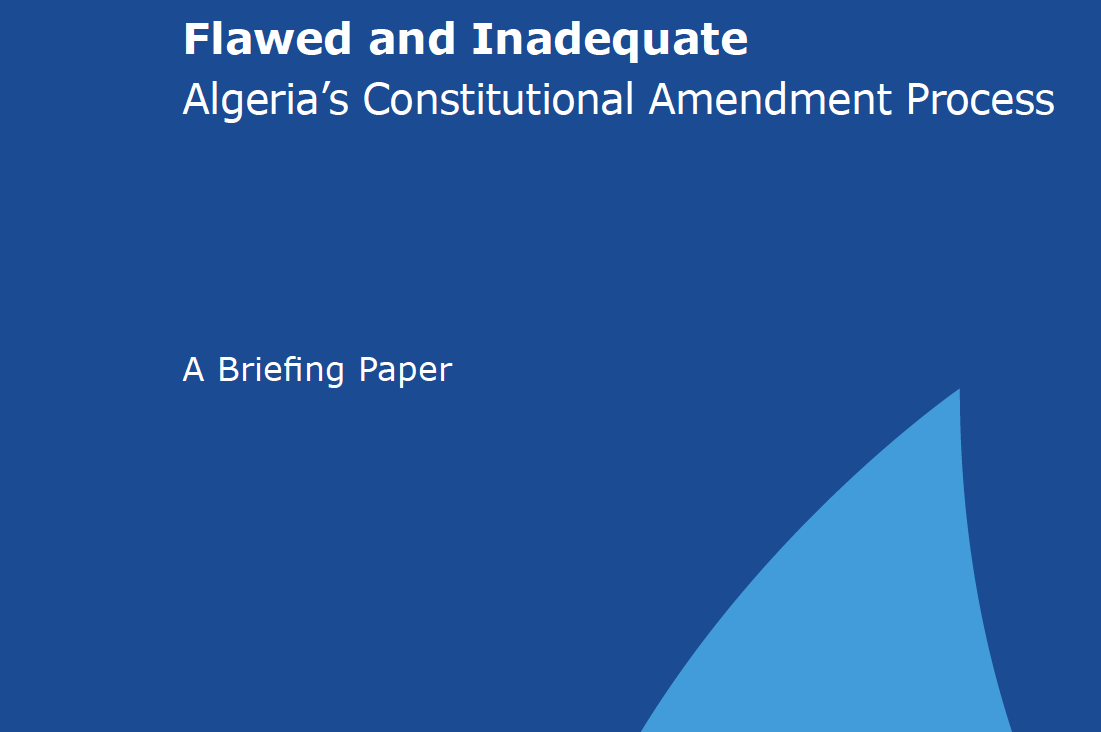As the country votes in a referendum Sunday, the ICJ called on the Algerian authorities to withdraw proposed constitutional amendments and reboot the flawed and inadequate amendment process so as to ensure wide public participation and debate in achieving reform.
In a briefing paper published today, the ICJ emphasized that central objective of the process should be to ensure that the amendments and the rule of law and human rights provisions in particular fully comply with Algeria’s international law obligations.
On 7 May, a set of draft Constitutional amendments were released by the Committee of experts, established by the President, Abdelmadjid Tebboune, in response to the mass protest movement (Hirak) that erupted across Algeria since February 2019.
The final draft was approved by the Algerian Parliament on 10 September and will be voted on by the Algerian people in a referendum on 1 November.
ICJ’s briefing paper analyses both the drafting process and the content of the proposed draft Constitution in light of international law and standards, providing a number of recommendations to the Algerian authorities to bring the process of amending the Constitution into compliance.
The ICJ is concerned that such process has failed to respect the principles of inclusiveness, participation and transparency. The arrangements relating to the role and powers of the President, the military and judiciary stand as an obstacle to a clean break form authoritarianism and decades of poor human rights practices in Algeria.
The ICJ called for a Constitution that lays the foundations for the establishment of the rule of law, the separation of powers and judicial independence.
“Under the constitutional amendments, the military is unaccountable, the president’s powers are unbridled, and the judiciary is subordinated to the President and the executive,” said Said Benarbia, the ICJ’s MENA Programme Director.
“The amendments are a roadmap to the past, not to a genuine democracy in Algeria,” he added.
The consultation process took place hastily and briefly in the middle of the Covid-19 pandemic and with restrictions on the right to freedom of assembly, against the backdrop of the government’s crackdown on the Hirak leaders, activists and journalists.
“Only a constitutional reform process that allows for the requisite public participation and direct discussion to take place can lead to a Constitution reflective of the views of large categories of the society,” said Benarbia.
“The failure to satisfy this standard undermines the right of all Algerians to take part in the conduct of public affairs and to freely determine and choose the form of their Constitution and government.”
Background
In the briefing paper, the ICJ makes a number of recommendations to the Algerian authorities, including to ensure:
- Adequate time and facilities are provided for the Constitution-making process to allow for a comprehensive public dialogue and the production of a draft Constitution that fully represents the views of Algerians.
- The full accountability and civilian oversight of the armed forces and their effective subordination to a legally constituted civilian authority, and that their role is adequately defined in the Constitution and specifically limited to matters of national defence.
- The rule of law is fully embedded in the framework for the functioning of the State, including by ensuring the clear separation of powers, attribution of competences and checks and balances between the legislature, the executive and the judiciary.
- That the High Judicial Council is independent from the executive, including by amending its composition to exclude the President from its membership and ensuring that the majority of members are from the legal profession and are elected by judges; that it is pluralistic and gender representative; and that it is empowered to uphold the independence of the judiciary.
- The primacy of international human rights law over domestic law. To this end, unequivocally assert that internal law, including the Constitution, cannot be invoked or deployed as a justification for non-compliance with human rights treaties to which Algeria is a party or customary international law.
- That permissible limitations or restrictions to human rights are undertaken only for a legitimate purpose as defined in international human rights law, are precise, free of ambiguity, limited in time and necessary and proportionate to the legitimate purpose.
Contact:
Said Benarbia, Director, ICJ Middle East and North Africa Programme, t: +41-22-979-3817; e: said.benarbia(a)icj.org
Download
Algeria-NewConstitution-Advocacy-Analysis Brief-2020-ENG (full briefing paper, English, in PDF)
Algeria- New Constitution-News-2020-ARA (full story, Arabic, in PDF)
Algeria- New Constitution-Advocacy-Analysis Brief-2020-ARA (full briefing paper, Arabic, in PDF)

